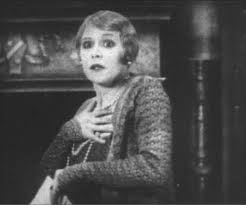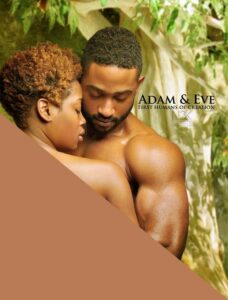The Fantastical Elements of Romantic Fiction, part 1
“Alexa, dim the lights,” the clip plays for the twentieth time.
Michael B. Jordan immediately obeys. Slowly—or too quickly?—he peels off his skin-tight black T-shirt, revealing smooth golden-brown skin striated with muscles and—
“Hey, what are you doing?”
I jump, tearing my eyes from the screen. My thumb pauses the Super Bowl commercial with a quick tap of the space bar. I blink, coming out of my trance to see my husband standing there, bare-chested with no rippling muscles.
“What?” I snap at him.
“What are you doing?” My husband’s blue eyes narrow, staring down at me.
“Can I help you?” I retort, wanting him to just go away so I can get back to my fantasy man.
“You’re watching Michael B. Jordan again, aren’t you?”
I clear my throat, my fingers shakingly caressing the keys of the keyboard. “So?”
“You’ve replaced me with him, haven’t you?” His voice raises, his skin flushing with color.
“Babe, you don’t understand. I love Michael B. Jordan.”
“He’s not me!” My husband’s hands curl into fists. “You prefer him to me!”
“Who wouldn’t? He’s better-looking than you, nicer than you, sweeter than you and has more money than you!”
Meanwhile, back in reality …
Actually, nothing like this happened. But admit it: I had you going there for a minute, didn’t I? There is some element of truth to it: Michael B. Jordan does have more money than we do. Can’t fault a man for his hard-earned wealth, can you?
In the real world, my hubs and I both laughed watching the commercial. He’s well-aware of my celebrity crush and he finds it funny. He’s not threatened by it. Back in 2012, I crushed on Korean actor So Ji Sub. Ever so often I get a new celebrity crush. Then, like every schoolgirl infatuation, it fades away.
Why readers critique romantic fiction
I use this fictional scenario because people who oppose romance fiction often give a reason like this: “Women use romance to create fantasy men that real men could never live up to.” They might add that men similarly use pornography to create fantastical women that real women can’t live up to. Romance books, they say, are simply women’s pornography.
So when romance readers say, “I’ve got a new book boyfriend,” opponents say, “See? They’re replacing fantasy men with real men.”
Recently, a guy in a Facebook group asked why romance was so popular. I got on my soapbox and said my few thoughts. Above me, someone had commented, “I stay away from romances because romances can be [deterrent to your spiritual condition].” I could flow with this statement. Then that person said: “Even if the reader is okay [with romance fiction], you should still stay away from it.”
Some people don’t even read romance, or have read only one or two books and fancy themselves expert critics of the genre. I’m often irritated when an author who doesn’t know the genre well says, “Oh, romance isn’t realistic.” Conversely, some authors decide to write romance for whatever reason, but refuse to read the genre and assume they know what a romance details. They craft a boring story that’s three thousand pages long with absolutely nothing happening.1
I thought I’d divide this article into a couple of parts. Yet before I can get into the fantastical elements, I need to answer or respond to critics and their concerns. After all, not all critique is wrong. For our purposes here in part 2, I’ll also keep the romance within the speculative fiction genre.2
Answering common critiques about romance
1. “Romance is all about sex.”
If you scrolled for sci-fi romances online, you’d likely see many books emblazoned with disembodied muscular male chests of different colors and textures. You’ll even see creature patterns like scales, blue skin, horns, red skin, tattoos, yellow skin, and other variant markings. An average romance reader would assume that these books all have sex in them. This may be true, and most often is.
them. This may be true, and most often is.
Sex does sell. Let’s not forget that.
People often associate this image with romance and assume that all romance is just sex books. Add the fantastical element, and these books are just about a guy and girl rolling around on black sand on some distant planet, right?
That’s not always the case.
As a consumer of romance for years, I’ve found that good romance shows the exploration of a couple’s journey to togetherness. It’s a reflection of real life.
Imagine you’re in a relationship and even married. What did that journey look like? Did you look at your sweetheart and fall instantly in love? Had you been close friends since childhood and then something changed the dynamic of your relationship? Were you co-workers who developed a friendship that led to something more without your even knowing it? Perhaps you first hated each other’s guts, and you fought the attraction?
To explore a couple’s romantic journey, we need intricate details because people are complex. Yes, people may have sex in a romance. People do that in real life. We wouldn’t be here if they didn’t. God created sex—let’s not forget that. (And it seems like a lot of Christians do.)
But not all romance has sex in it. Some fall into the “clean and wholesome” category with a “first kiss and blush” level of heat. Some stories have more romantic or sensual tension in them. Others may go into detail, and then “stop at the door.”
Whatever the romance’s heat level, it’s ancillary to the couple’s relationship journey.3
2. “Romance can cause spiritual deterioration to readers.”
To some extent, I can agree with this statement. Women—and men—can turn toward fantasy instead of realistic expectations.
I used the Michael B. Jordan commercial as a humorous example of this kind of fantasy. After all, he is some fans’ ideal man, thanks to his sex appeal and muscular form. Near the commercial’s end, the wife in the bathtub tells Michael B. to read her an audiobook, while her husband is knocking on the door.
It’s humorous, but if you know how the fantasy causes harm, you might not see this as humorous. Seriously: she’s shut her husband out and is entwined in the fantasy.
But oh! It’s Michael B. Jordan! Can you blame her?
Romance books can for sure lead to real harm. If readers seriously expect guys to act like a romantic fiction dude, that can cause rifts, just like pornography, with its presentation of sex without humanity or relationships. We cannot objectify people until they are mere body parts performing acts without the context of humanity.
I can hear someone say, “So Parker, since you’re saying that a little romance is okay, are you saying it’s okay to look at a little porn.”
No. So stop it. What am saying is that romantic fiction can lead to unhealthy reader fantasies. If a reader finds herself in that place, I would suggest getting help, just like someone with a porn addiction needs help.
3. “Romance writers who write steamy romances aren’t Christians.”
I’ve read some steamy romance books where I’ve concluded the author cannot be a Christian. But you might be surprised to learn that some Christian writers of romance have no issue with writing steamy content. They’re not always writing under pen names, either. I’ve also read squeaky-clean romances whose authors aren’t a Christian at all. We can’t brush all romance writers with one color of paint.
4. “Christian romance is all squeaky-clean.”
Many readers assume Christian romance is Amish fiction. I have no idea where they get that idea.4 I’m an advocate of edgy Christian fiction and realistic depictions of reality. A good friend of mine writes Christian fiction with real-life depictions, including the steamy parts of relationships.
Some Christian fiction, not just romance, over-spiritualizes sensuality. By over-spiritualizing it, we tend to sterilize it. I refuse to believe that the hero isn’t aware of the heroine’s physical charms. Nor do I believe that a heroine doesn’t see those signs of masculinity that may appeal to her. That’s a big flaw. It’s one reason why the purity movement, despite good intentions, can become a stumbling block. These messages pressure Christians with “Don’t do it,” without addressing the real feelings and sensations of sensuality. Their focus is on virginity, like this will make you a better Christian, when all virginity does is make you obedient. You can still be a rather bitter, horrible Christian and be a virgin.
Plus, the purity movement puts so much pressure on these young girls and make their salvation based on a physical state and not their relationship with Christ. In addition, some proponents give the men a get-out-of-jail free card. Why should it always be on the women to maintain purity and not the men?
My critique of the purity movement doesn’t mean that I disagree with it entirely. As Steve Burnett reminded me, “we live in a society that burns incense to the gods of human genitalia, and it seems short-sighted for Christians to focus solely on debunking “purity culture.” Sexual impurity is distinct from other sins in a way that destroys from the inside out. 5
My own romance is ‘sweet and edgy’
With that, I think I’ve covered the critiques I’ve received the most.
For myself, I write what I call sweet and edgy romance. My books include romantic or sensual tension, but I also follow a behind-closed-door approach. That’s where I am comfortable, and my readers seem to share this comfort level.
Real romance explores a couple’s journey, including but not limited to their physical attraction to one another. When I think of Adam and Eve, I love thinking about how Adam must have reacted when he first saw Eve. What did Adam think when he learned that God had handcrafted this woman for himself, and that she, and she alone, was meant only for him just as he was meant for her?
Every great romance today mirrors the very first romance long ago. We see the one woman whom the man wants for his very own. We see the woman who basks in her man’s complete devotion, who in turn treats her as his one true treasure.
When Adam saw Eve, he said, “This is now bone of my bone and flesh of my flesh.”
Today, our vows also say: What God has put together, let no man put asunder.
Ah! Isn’t that romantic?
- What about Christian romance? Oh gosh! I would have so many things to say about that. ↩
- In this series’ second part, my good friend Travis Perry will share his one experience with writing romance with me. ↩
- The exception to this rule is erotica. Erotica uses sex as a plot device, and sex is the driving force of the couple’s journey. ↩
- Even real Amish people need to be saved just like the rest of us. Some Amish cultures also have a works-based sort of religion. ↩
- Furthermore: (1) sex is a uniquely mystical act, so that sexual sins fall into a distinct category of sin, (2) sex is reserved for committed and loving relationships per covenant marriage (or even civil arrangements that still reflect covenant marriage), (3) people can find recovery from lost virginity or relationships based on sensuality abuse, but they will still confront some consequences all of their lives. ↩







































Why oh why did you have to open this with my celeb crush, the gorgeous Michael B. Jordan!
😉
Seriously, though, I have long had some of the ideas about romance that you mention here – that it’s basically porn for women, etc.
More recently, I’ve learned from some of my fellow writers that it can be much more than that. The genre can be quite respectable, and delves into parts of the human experience that ought to be explored in fiction.
It can still be done poorly or with unnecessary salaciousness. And I believe it is unhealthy for some women. But it is not inherently as bad as I once thought.
Still not my favorite to read, though! 😉
A lot of people do so don’t feel bad. It’s no different with people who think speculative fiction is bad for the soul. Any sort of it, in any capacity. I get flack for it, but one thing about the industry is that we have to develop thick skins.
Your article is definitely food for thought. I consider myself a sweet and edgy romance reader. I look forward to reading your second article on this subject.
I hope I do justice to the second part of this!
YouTube recommended me a vidya where a female reviewer ranked romance tropes on a tier list, and her top picks were about the yearning, and I’m right there with her. Gimme that yearning. Mutual pining and a slow burn? Ded.
But at the same time, because I’m contrarian, Imma push back on the notion that sex is a uniquely mystical act, per your footnote. Maybe I just have trouble understanding what people mean by “mystical” in this context? Is it because these people have few sources of euphoria in their lives? Is it because they’re trying to reconcile it with the long-standing Christian tradition of demonizing sex (often literally)?
Thank you for responding. What do you think mystical in this context means?
TBH, I don’t think “mystical” even applies in this context. In fact, there are a lot of people who would argue that it’s one of the most earthy, bodily, non-spiritual things you could experience, yanno, because without our bodies we would not experience that kind of euphoria that feels like your bones are melting at the ends and leaves all your muscles relaxed.
Granted, one can have sex and not experience what I consider the ‘mystical’ connection of physical intimacy. But when the God of the Bible talks about knowing us, it’s not just knowing our names but an intimate connection with Him. When He calls the church His Bride, he’s not talking a platonic relationship but one of deep spiritual and physical togetherness as marriage symbolizes.
But some choose to only see it as merely a physicality, and that’s their prerogative.
I like the way you introduced the post with a good dose of comedy XD
Recently I actually did a post about the importance and use of romance in fiction. Honestly I used to be a bit of a snob when it came to straight up romance stories(little kid me thought they were silly), but have since learned that romance can be a well written plot device, just like any other aspect of life. And I’ve actually seen writers experience problems when they can’t write romance well. Either they really struggle to make those elements turn out right, or they end up failing in that department because they were paying attention to everything EXCEPT the romance. And then that causes problems with characterization/plot…which gets noticed by fans, who will either complain or see the characters way differently than the author intended.
Reading a wide variety of romance stories can reveal a lot about human nature, too. Especially if they’re webcomics or fanfictions. I like to analyze stories in relation to what authors and reviewers/commentors say, and it’s…telling, to say the least. On one hand it can be frustrating to see what people think and how they react to certain things, but at the same time it’s extremely fascinating.
Some authors don’t realize how effective a solid romantic thread in their works can add to the overall cohesiveness of a story. This is something I will be exploring in the next part of this series. Relationships matter and if this pandemic hasn’t shown us just how vital interpersonal relationships, romantic or otherwise, I’m not sure what else can.
Dumb Youtube trash that I <3:
What a wonderful post! I love the realness of it all. When I first started writing, I agonized over writing something that I thought may lead readers into some kind of sinful indulgence. After much prayer, I felt released to write stories that were more human. Characters, like real people, are flawed. They struggle with a sin nature. Christian artists/writers/dancers/authors… are given a platform and we must perform our best work, and that includes writing cutting edge romantic fiction that shines as a bright and excellent work that points toward the glorious hope of Jesus Christ.
Hi Sarah,
Thank you so much for responding. People are flawed and forever will be! hahaha!